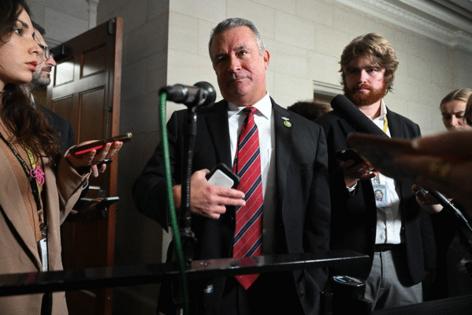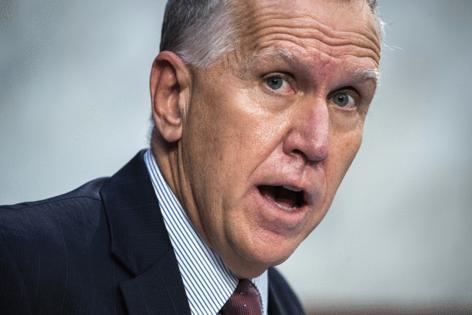Exits by Tillis and Bacon demonstrate Trump's enduring grip on modern GOP
Published in Political News
WASHINGTON — The looming departures of North Carolina Sen. Thom Tillis and Nebraska Rep. Don Bacon represent the latest retreat by members of the Republican mainstream and another sign of President Donald Trump’s firm grip on his party.
Tillis, especially, surprised political observers over the weekend when he announced his retirement after getting slammed by Trump over his opposition to the president’s signature domestic policy legislation.
“Trump is growing more confident in his leadership of the Republican Party,’’ GOP strategist Alex Conant said. “You can’t just get on his good side with some nice tweets. You have to vote for his agenda. ... Clearly, he’s learned a lot about politics over the last 10 years, and one of the things he’s learned is that political power is useless if you don’t use it to advance your goals.”
Still, the president’s brand of politics doesn’t play in every House district, particularly the purple ones like Bacon’s that the GOP needs to maintain its majority. And on the Senate side, while Republicans have a favorable map going into next year’s midterms, Tillis’ retirement gives Democrats an opening to gain a seat the party lost in 2014.
Neither Bacon nor Tillis identifies as a moderate, and both have, by and large, voted with their party on most issues.
Bacon, a retired Air Force brigadier general who reveres Ronald Reagan, has had to navigate Trump’s demands while representing an Omaha-area district that’s become increasingly Democratic on the presidential level — Kamala Harris carried it by 5 points last year, according to calculations by The Downballot. Yet his occasional criticisms of Trump, his support for Ukraine and his condemnation of Russia have made him an outlier in the modern GOP.
Tillis has long been a reliable conservative, who, as North Carolina House speaker, helped steer the state rightward. He pushed for changes to the tax code that implemented a flat income tax and lowered corporate tax rates; backed a state ban on gay marriage; supported anti-abortion laws; and endorsed requiring drug testing for welfare recipients.
In announcing their retirements, both men lamented the rise of tribal politics in the Trump era.
“It’s disconcerting to get attacked from the right,’’ Bacon said Monday at a news conference in Omaha, at which he also highlighted his ability to work across the aisle.
Tillis bemoaned the decline in bipartisanship in Washington and suggested his own party bore some culpability.
“When people see independent thinking on the other side, they cheer. But when those very same people see independent thinking coming from their side, they scorn, ostracize, and even censure them,” the two-term senator said in a statement Sunday.
The sprawling GOP budget reconciliation bill — which passed the Senate on Tuesday by the slenderest of margins — has exposed deep rifts among congressional Republicans. Along with Tillis, two other GOP senators voted no: Kentucky’s Rand Paul and Maine’s Susan Collins, who is among the chamber’s most vulnerable members on the ballot next year. The measure heads back to the House, where fiscal hawks have publicly railed against changes in the Senate version, leaving the bill’s prospects for final passage uncertain.
Trump, who threatened to back a primary challenger against Tillis after he voted against advancing the reconciliation bill, cheered the senator’s impending departure from the chamber.
“I had it out with this guy two nights ago, and he resigned, which I was happy about,’’ the president told reporters aboard Air Force One on Tuesday after a trip to a new detention center for migrants in South Florida. “He did us all a favor.”
Tillis now joins a cadre of past senators, including Arizona’s Jeff Flake, Tennessee’s Bob Corker and Utah’s Mitt Romney, who opted to walk away from politics rather than continue tangling with Trump.
As Trump marks a decade in politics — and almost six months into his second term as president — most Republicans know that challenging him carries a steep price, said Jonathan Weiler, a political scientist at the University of North Carolina at Chapel Hill.
“Once (Tillis) decided to actually vote against the budget, he certainly knew what would be coming,” he said.
Trump’s ever-shifting policy positions can at times complicate efforts by his fellow Republicans to remain in his good graces.
“I found it difficult when I was in the Senate,” Flake, who denounced Trump on the chamber floor in 2017 after deciding not to run for reelection, said in an interview. “We’d go to the White House in the morning and strike an immigration deal that was no longer valid in the afternoon.”
Flake, who bristles at the notion of being called a moderate, said Trump and his supporters demand that Republican lawmakers not only express their unyielding loyalty, but also emulate his combative style.
“It’s not just the issues,” the former senator said. “You’re expected by that subset of a subset of a subset that votes in Republican primaries to be mean and angry now. … That was never me, and that’s not really Thom either.”
Trump’s refusal to tolerate dissent could at least partly be attributed to the narrowness of the GOP’s majority in both chambers, Conant said.
“There’s no room for dissent within the conferences,’’ he said. “If [Trump] had huge majorities, he could look past dissent, but since he needs every vote, he has to wield his power aggressively.’’
A successor to Tillis
Senate Democrats greeted the news of Tillis’ retirement with glee.
“Thom Tillis’ decision not to run for reelection is another blow to Republicans’ chances as they face a midterm backlash that puts their majority at risk,” Maeve Coyle, a spokesperson for the Democratic Senatorial Campaign Committee, said in a statement.
As the Republican field to succeed the senator takes shape, Trump is expected to play an outsize role. While a few Republicans had already lined up to challenge Tillis before he ended his reelection bid, higher-profile hopefuls are certain to jump in.
Potential contenders include Republican National Committee Chairman Michael Whatley and several congressmen such as Rep. Richard Hudson, who leads the House Republican campaign arm, and Rep. Pat Harrigan, a freshman lawmaker and retired Green Beret.
Then there’s presidential daughter-in-law Lara Trump, a North Carolina native and former RNC co-chair. The Trump name remains strong in a state that backed her father-in-law in all three of his elections.
On Tuesday, Trump said Lara Trump would “always be my first choice” and that “she really knows North Carolina well.” But he also noted that she now lives in Florida, where she was the subject of speculation for another Senate vacancy earlier this year.
“I don’t know who the candidates (in North Carolina) are going to be,” Trump told reporters Tuesday. “I think you’re going to have one of the congressmen step up, and should do very well.”
-------
(CQ-Roll Call's John T. Bennett contributed to this report.)
-------
©2025 CQ-Roll Call, Inc., All Rights Reserved. Visit cqrollcall.com. Distributed by Tribune Content Agency, LLC.




























































Comments